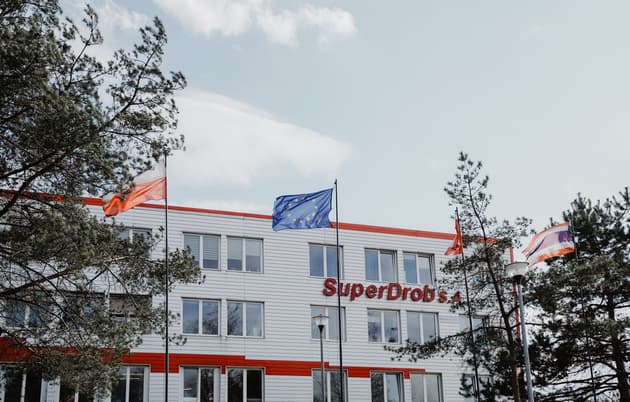
Government failings allowed deadly diseased chicken to stay on UK shelves
The UK government allowed food companies behind a major salmonella outbreak to continue supplying supermarkets even after contaminated meat had been linked to the deaths of four people and poisoned hundreds more.
In April 2021, a year into a major nationwide salmonella outbreak, food safety chiefs and George Eustice, then the environment minister, decided not to impose restrictions on the suppliers responsible after noting “a significant improvement” in the situation.
But earlier this year, the Bureau of Investigative Journalism (TBIJ) found that one of the companies continued to produce diseased chicken for months after the decision, exposing consumers to grave risk.
TBIJ also revealed that the meat was infected with dangerous antibiotic resistant “superbugs”. Meat produced by the Polish poultry giant SuperDrob – which supplies frozen chicken products to Asda, Lidl and Iceland – tested positive for salmonella more than a dozen times after the outbreak was first traced to one of its plants in September 2020. Infected products were then detected throughout the following year.
SuperDrob said that at the time there was no need for individual infection control due to low infection rates, but that it introduced its own system for the control of salmonella which was developed by poultry disease and quality department specialists. It said that it also varied the contracts with its breeders to ensure that these systems were in place at their facilities. It said that no similar instances have been detected in its products since March 2021.
The continued sourcing from SuperDrob was just one of several failings in the government’s handling of the outbreak. It has also emerged that UK food safety and public health chiefs failed to inform doctors – and the Polish government – about the full extent of the risks posed by the contaminated meat.
The Bureau newsletter
Subscribe to the Bureau newsletter, and hear when our next story breaks.
TBIJ has learnt that although tests carried out by Public Health England showed the salmonella to be antibiotic resistant – meaning treatment options for the most seriously ill patients could be limited – the agency failed to disclose this fact to frontline health workers, including those treating victims.
TBIJ has also established that the Food Standards Agency (FSA) did not inform the Polish authorities that the outbreak was in fact a superbug variant of salmonella, impeding possible investigations into practices on the farms involved.
The investigation has also uncovered that the strain in question had been recorded in the UK as far back as 2012. New evidence indicates that many imported chicken products were contaminated with superbug variants, which resisted antibiotic treatments.
SuperDrob said the drugs were in use but denied any overuse of antibiotics and said that such behaviour is also prohibited for its suppliers. It denied that any of its facilities are unhygienic or in substandard condition, and it said that all of its policies adhere to EU and Polish legal requirements and that many are even stricter than current requirements.
Leading food safety lawyers Michelle Victor and Andrew Jackson of Leigh Day described the findings as deeply worrying and said they “indicated major failings of safeguards at every level, with the consequence that hundreds if not thousands of people have suffered illness and injury”.
Steve Nash, a campaigner whose daughter died after eating contaminated meat in another outbreak, criticised the decision to continue importing Polish chicken despite known risks.
“This salmonella outbreak could have been stopped sooner if appropriate action had been taken by the relevant government departments,” he said. “Supermarkets and large businesses have still done very little to ensure their suppliers are selling them products that are safe.”
It has also emerged that Poland exported meat contaminated with superbugs to numerous European countries, including the UK, for five years before the 2020 outbreak.
And since TBIJ’s revelations in June, dozens more consignments of contaminated poultry meat originating in Poland have been discovered across the EU, highlighting the ongoing public health threat.
A TBIJ analysis of the genetic code of the salmonella samples linked to the 2020 outbreak found that many were in fact superbugs, meaning the initial treatments being given to patients could have been ineffective.
In December 2020 Christine Middlemiss, the UK’s chief veterinary officer, wrote to her Polish counterpart, Bogdan Konopka, calling for action. The letter, seen by TBIJ, disclosed that cases matching the salmonella strain responsible for food poisoning had been recorded in the UK as far back as 2012 and amounted to almost 1,300 cases.
When asked about recent infections linked to Polish poultry, the country’s chief veterinary inspectorate told TBIJ that vets in Poland had detected around half the cases raised on the EU’s alert system and that these numbers are decreasing year on year. An EU commission spokesperson also said that the number of alerts had declined so far this year based on the same January to August period in previous years.
Poland’s chief veterinary inspector also said that the prophylactic (or preventative) use of antimicrobials was not common practice on Polish poultry farms and that antibiotics are only administered by a vet on prescription once they have examined an animal. It added that it has introduced a national plan to protect antibiotics and that “farmers and companies make far-reaching efforts to supply high-quality poultry products to both the domestic and foreign markets”.
 SuperDrob's headquarters in Karczew, Poland
SuperDrob's headquarters in Karczew, Poland
Communication problems
Despite failing to inform others about the superbug status of the outbreak, the scale of illnesses did prompt the FSA to commission a wider study into the scale of contamination rates and antibiotic resistance in frozen, breaded and battered poultry products on sale in the UK in spring 2021. This included meat from the UK, Ireland and Poland.
However, documents show that it struggled to raise the alarm about the key findings, including that a potentially dangerous antibiotic-resistant gene had been discovered in chicken contaminated with E.coli. The delays meant antibiotic resistance could have spread in the UK for months.
Internal FSA emails reveal that the mcr-1 gene, which can make bacteria resistant to various drugs including colistin, a “last-resort” treatment for humans, was detected in contaminated chicken products in May 2021. But the concerning sample only came to light when an FSA official spotted it more than six months later.
In correspondence obtained by TBIJ, the official mentioned an E.coli sample that demonstrated the mcr-1 gene and resistance to colistin. But despite the live risk of antibiotic resistance spreading, neither manufacturers nor retailers were informed.
Months later, another unnamed official indicated the alerts could have been left unread in a shared email account.
Ron Spellman, a meat inspector with more than 35 years’ experience, said the investigation raises questions about enforcement at both an EU and UK level given that audits had identified failings in Poland’s salmonella controls as far back as 2014.
“High levels of salmonella in Polish poultry has been a problem for a long time, and some consumers have paid for this with their lives,” he said. “What are the FSA and EU Commission going to do about it?”
The FSA said it notified the Commission and Poland voluntarily agreed to introduce safety measures – including more thorough cooking of chicken before it was frozen and increased surveillance – so it was not necessary to restrict imports from the country. It said there were no delays in disseminating the AMR findings and “the AMR detected was of low risk to public health and not considered a food safety concern”. It didn’t inform Polish authorities about the antibiotic resistance, it said, because “it is our responsibility to inform on food safety risks”.
The UKHSA said it was “among the first in Europe to detect and investigate these outbreaks of Salmonella Enteritidis linked to chicken products in 2020” and that salmonella does not usually require antibiotic treatment. It added it was “not standard practice” to alert other countries, “unless strains are resistant to multiple antibiotics or have an unusual resistance profile and are likely to impact management of cases”.
An EU Commission spokesperson said it was “currently carrying out audits to ensure compliance with the rules on veterinary medicine products and in view of the overall high and increasing sales of antimicrobials ” in Poland, but that the country has committed to reduce by 10% its use of antimicrobials by 2030 as part of its national plan. They said Poland has been identified as one of the first member states to be audited as a priority this year.
Header image: Oliver Kemp for TBIJ
Reporters: Misbah Khan and Andrew Wasley
Impact Producer: Grace Murray
Environment Editor: Rob Soutar
Editor: Franz Wild
Production Editor: Alex Hess
Fact checker: Lucy Nash
Our reporting on antimicrobial resistance is part of our Environment project, which has several funders. None of our funders have any influence over our editorial decisions or output
-
Area:
-
Subject:



